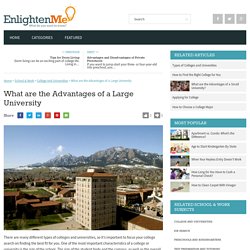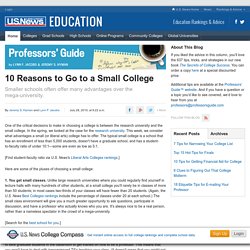

What are the Advantages of a Large University. There are many different types of colleges and universities, so it’s important to focus your college search on finding the best fit for you.

One of the most important characteristics of a college or university is the size of the school. The size of the student body and the campus, as well as the overall scope of the school, are key factors in determining a college or university’s educational environment. In general, large universities are schools that have student bodies of over six thousand undergraduates. School sizes vary, but some state universities boast enrollments of over fifty thousand undergraduate and graduate students. Large universities offer many advantages over smaller schools, and are wonderful for certain types of students.
A large enrollment also means a bigger community, which creates more opportunities and a dizzying array of activities. Large universities also boast considerable financial advantages. Share. Small Versus Large Schools: The Truth About Equity, Cost, and Diversity of Programming. Learn more l register online l special rates l six month payment deferral l testimonials Transforming Teaching Through Place, Service-Learning and Sustainability Community Works Journal—ONLINE MAGAZINE for Educators Small Versus Large Schools: The Truth About Equity, Cost, and Diversity of Programming in Small and Large Schools By STUART R.

GRAUER, Ed.D. Dr. Powerful and often compelling myths about “real” schooling tend to govern our collective assumptions about normalcy, and these myths have silently, steadfastly advanced the move to larger, more consolidated schools and hampered any real proliferation of the small schools model in our country. We had been aware of various myths distorting our collective viewpoints about what a school should be, and our research turned up still more. The sense of connectedness in small schools is not only felt and shared among students, it is shared by virtually all stakeholders and, in particular, with teachers. We took a look at course offerings. Education World: Are Smaller Schools Better Schools? Reforming public education may be as simple as creating smaller schools.

The results of two recent studies indicate that small schools may be the remedy for lots of what is wrong with public education. Small schools can reduce the negative effects of poverty, reduce violence, and increase parent involvement and student accountability. Creating a better school may be as simple as creating a smaller one.
The results of two recent studies indicate that small schools may be the remedy for lots of things that are wrong with public education, especially for the nation's poor children. The separate studies credit small schools with reducing the negative effects of poverty on student achievement, reducing student violence, increasing parent involvement, and making students feel accountable for their behavior and grades. Educators have long known that poverty hurts student achievement. The researchers initially evaluated schools in California. "Teacher satisfaction went way up! " Small Colleges vs. Large Universities: The Benefits of Each.
Sizing Up Colleges: Big vs. Small. As you begin your college search, one of the first decisions you need to make — and one that helps narrow your list — is what size college you want to attend.

U.S. colleges offer many options, from small colleges with fewer than 1,000 students to large state universities with more than 35,000 students. What's best for you depends a lot on your personality and academic goals. The Big College Experience Do you picture yourself at a Big Ten university that offers everything from televised sporting events to countless degree programs? Are you itching to break free of the high school fishbowl and enjoy the anonymity that comes with being one of thousands of students? Here are some of the benefits associated with big colleges.
Wide variety of majors and courses Well-stocked libraries Variety of housing opportunities Well-funded sports programs Wide range of academic choices and student activities Distinguished or famous faculty State-of-the-art research facilities Things to Consider. 10 Reasons to Go to a Small College. One of the critical decisions to make in choosing a college is between the research university and the small college.

In the spring, we looked at the case for the research university. This week, we consider what advantages a small (or liberal arts) college has to offer. The typical small college is a school that has an enrollment of less than 5,000 students, doesn't have a graduate school, and has a student-to-faculty ratio of under 10:1—some are even as low as 5:1. [Find student-faculty ratio via U.S. News's Liberal Arts Colleges rankings.]